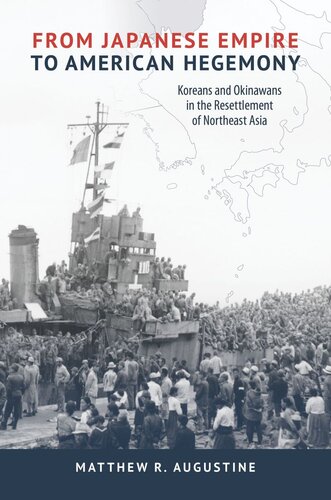

Most ebook files are in PDF format, so you can easily read them using various software such as Foxit Reader or directly on the Google Chrome browser.
Some ebook files are released by publishers in other formats such as .awz, .mobi, .epub, .fb2, etc. You may need to install specific software to read these formats on mobile/PC, such as Calibre.
Please read the tutorial at this link: https://ebookbell.com/faq
We offer FREE conversion to the popular formats you request; however, this may take some time. Therefore, right after payment, please email us, and we will try to provide the service as quickly as possible.
For some exceptional file formats or broken links (if any), please refrain from opening any disputes. Instead, email us first, and we will try to assist within a maximum of 6 hours.
EbookBell Team

4.8
24 reviewsWhen American occupiers broke up the Japanese empire in the wake of World War II, approximately 1.7 million people departed Japan for various parts of Northeast Asia. The mass exodus was spearheaded by Koreans, many of whom chartered small fishing vessels to ship them back quickly to their liberated homeland, while wartime devastation hampered the return of Okinawans to their archipelago. By the time the officially endorsed repatriation program was inaugurated, however, increasing numbers of people began escaping US military rule in southern Korea and the Ryukyu Islands by smuggling themselves into occupied Japan.
How and why did these migrants move across borderlines newly drawn by American occupiers in the region? Their personal stories reveal what liberation and defeat meant to displaced peoples, and how the compounding challenges of their resettlement led to the expansion of smuggling networks. The consequent surge of unauthorized border-crossings spurred occupation authorities into forging exclusionary migration regulations. Through a comparative study of Korean and Okinawan experiences during the postwar occupation era, Matthew Augustine explores how their migrations shaped, and were in turn shaped by, American policies throughout the region.
This is the first comprehensive study of the dynamic and often contentious relationship between migrations and border controls in US-occupied Japan, Korea, and the Ryukyus, examining the American interlude in Northeast Asia as a closely integrated, regional history. The extent of cooperation and coordination among American occupiers, as well as their competing jurisdictions and interests, determined the mixed outcome of using repatriation and deportation as expedient tools for dismantling the Japanese empire. The heightening Cold War and deepening collaboration between the occupiers and local authorities coproduced stringent migration laws, generating new problems of how to distinguish South Koreans from North Koreans and “Ryukyuans” from Japanese. In occupied Japan, fears of communist infiltration and subversion merged with deep-seated discrimination, transforming erstwhile colonial subjects into “aliens” and “illegal aliens.” This transregional history explains the process by which Northeast Asia and its respective populations were remade between the fall of the Japanese empire and the rise of American hegemony.